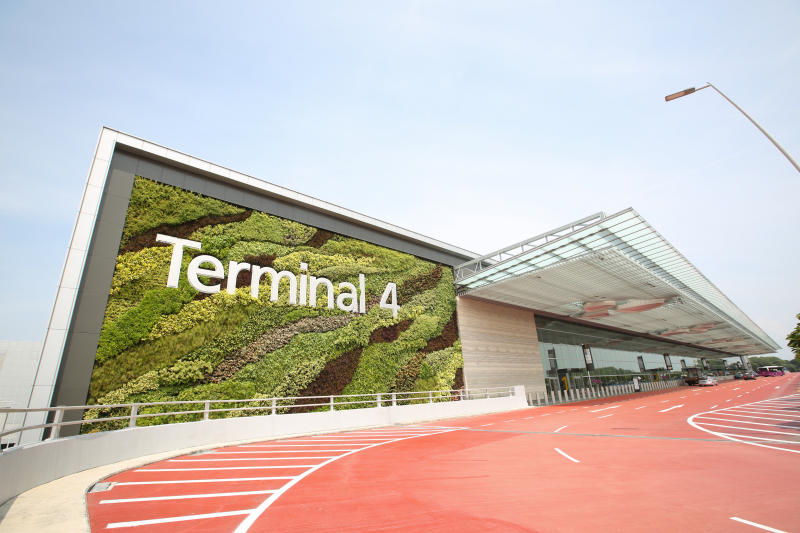Changi Airport Terminal 4 could be used to process passengers from places with high Covid-19 risk
Sign up now: Get ST's newsletters delivered to your inbox

This option is being considered as Terminal 4 has a larger capacity as compared to Terminal 2, where these travellers are currently being processed.
PHOTO: ST FILE
SINGAPORE - Travellers flying into Singapore from countries with high rates of Covid-19 infections may be processed at Changi Airport Terminal 4 in the future.
This option is being considered as T4 has a larger capacity than T2, where these travellers are currently being processed, said Transport Minister S. Iswaran in Parliament on Tuesday (July 6).
T2 has been closed for renovation works since May last year. But it was partially reopened to handle passengers from places deemed to have "very high risk" of Covid-19 infections, after the outbreak of a Covid-19 cluster at the airport which involved 43 workers in May this year.
Mr Iswaran, who was responding to a question from Mr Saktiandi Supaat (Bishan-Toa Payoh GRC), said: "If we are able to use T4, then it enhances our ability to deal with flows from the very high-risk countries."
He said the various agencies involved are now working on this option but did not provide a timeline as to when it could be implemented.
Mr Iswaran added that it is difficult to determine whether the arrangements to repurpose T2 and T4 would be permanent.
"I would say that the mindset that we have adopted is one... (to) prepare for the worst, hope for the best and be as adaptable as possible, and respond quickly to an evolving situation," he said.
He told the House that 95 per cent of front-line aviation workers are fully vaccinated.
He also reiterated that Covid-19 precautions were already being introduced progressively at the airport even before the May outbreak. The precautions included separate health screening stations for passengers from very high-risk places.
In response to a follow-up question from Worker's Party MP Leon Perera (Aljunied GRC), who cited a Straits Times forum article from April expressing concerns about measures at the airport, Mr Iswaran said: "There may well have been some intermingling, but that was not something that was encouraged."
On why passengers had the opportunity to intermingle previously, he said the authorities had determined safety measures based on detailed risk assessments, which were driven by available information about the virus.
"This is a risk-adjusted approach, and it has to be so," he said.
"What we need to do is ensure that the posture we adopt and the measures that we adopt respond promptly to the latest understanding, and address the risks that are posed in a dynamic situation."
He outlined several measures that have been put in place since the Changi Airport cluster. For example, the airport is now segregated into physical zones.
Disembarkation piers, toilets, arrival immigration halls and baggage claim belts are now separate for passengers from places of different risks, he added.
Mr Iswaran acknowledged that the changed workflow will result in further stress for workers. The Transport Ministry is working with union leaders and industry players to help the workers adapt.
He also elaborated on the precautions practised on the private charter buses which ferry travellers from high-risk places to their stay-home notice facilities.
Mr Iswaran told Mr Gerald Giam (Aljunied GRC) that the buses are cleaned and disinfected after every trip. Bus drivers are trained to don protective equipment, including an N95 mask and a protective gown. They are fully vaccinated and go for regular Covid-19 testing.
"Travellers are not allowed to sit near the driver and occupy only the rear section of the vehicle. The number of travellers allowed on each bus is also limited to less than half its total capacity to ensure adequate safe distancing between travellers," he added.
Mr Iswaran also said that passengers who arrive from countries deemed to be less risky in terms of Covid-19 will be allowed to take other modes of transport home. But they will still have to take a swab test on arrival in Singapore.
Separately, Senior Minister of State for Transport Chee Hong Tat told the House that discussions over recognition of immunisation records and Covid-19 test results with other countries will likely take some time, given that the countries have different rates of vaccination.
Mr Chee, who was responding to a question from Mr Ang Wei Neng (West Coast GRC), said Singapore is in bilateral discussions with several countries, including Australia, Malaysia and South Korea, about the issue.


